A security adviser to the prime minister said Thursday that Indonesian fighters are involved in Thailand's Muslim insurgency, contradicting the official view that the bloody separatist movement was strictly a home-grown affair.Jeff over at GeoPolitical Review has been keeping track of Muslim attacks in Thailand and here is an example and here's another.
"I have warned the authorities concerned several times about Indonesian fighters sneaking into the region but they have ignored it," Gen. Kitti Rattanachaya told The Associated Press, saying the militants infiltrated from the Indonesian province of Aceh.
Although there have been rumours of Indonesian Muslims joining their Thai co-religionists in the country's southernmost provinces, no substantial evidence has yet emerged to back the claim. Most analysts still regard the insurgency as domestic, but with a strong potential to attract foreign Muslim militants including adherents to the al-Qaeda linked regional terrorist network, Jemaah Islamiyah.
"We must be ready to dare all for our country. For history does not long entrust the care of freedom to the weak or the timid. We must acquire proficiency in defense and display stamina in purpose." - President Eisenhower, First Inaugural Address
Friday, September 30, 2005
Probably not good news: Indonesians involved in southern Thailand unrest, general claims
Report says Indonesians involved in southern Thailand unrest, general claims. The general quoted is Thai, of course. He will probably not win the Nobel Peace Prize.
Deja vu all over again: Somali Pirates Release World Food Program ship?
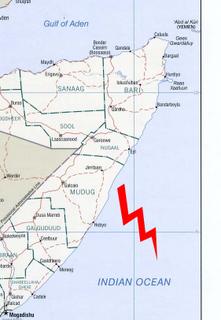
Once again, the Somali pirates allegedly have released the World Food Program vessel M/V Semlow (and one other seized since) as reported here.
Reports from Harardhere town in central Somalia say the hijackers who held two ships in that area finally released them and all crew. This sudden move happened after town and area elders persuaded them to do the right thing. Both ships are now on their way to a makeshift port near Mogadishu. The main Mogadishu port has been close for many years.The last time a release was alleged, it was not true. That was 15 days ago.
Well, I hope it's true.
But remember, just STAY AWAY FROM SOMALIA!!!!
Latest ONI World Wide Threat to Shipping (28 September 2005)
For latest ONI WWTS, go here and click on the date.
Highlights:
1. The continuing saga of the M/V Semlow, World Food Prgram ship, now being used by Somali pirates to capture more ships.
2. This bit of fun from Indonesia, where subsidized fuel has opened the door to smuggling, which the government is trying to close:
3. French union troubles:
4. Fun off Nigeria. Question: How, exactly, do 20 people seize a port?
5. This from "BANGLADESH: Firefight between pirates and enforcement
authorities 27 Sep, Monpura, in Bhola. A 16 member joint forces
team encountered two trawlers with pirates onboard and challenged
them. The pirates opened fire and the joint forces retaliated.
Authorities estimate 15 of the 70 pirates were killed in the
Firefight. Five members of the joint forces team were injured.
The authorities arrested three wounded pirates and confiscated
one of the trawlers."
6. And a lot of "sea robberies" and more...
Highlights:
1. The continuing saga of the M/V Semlow, World Food Prgram ship, now being used by Somali pirates to capture more ships.
2. This bit of fun from Indonesia, where subsidized fuel has opened the door to smuggling, which the government is trying to close:
According to police reports, authorities have
impounded 17 ships, including at least five foreign flagged
vessels, since February in anti-fuel smuggling operations, per 21
Sep reporting. About 6000 tons of fuel have been confiscated,
including 3,000 tons on 27 Aug from the Korean flagged oil tanker
(TIOMAN). Five foreigners are among 58 people detained, all
believed to be captains or crew. In a recent speech, the
Indonesian president explained fuel smuggling has resulted in
losses amounting to $8.74 million each year. He indicated that
officials from state-owned oil and gas giant Pertamina could be
involved. Smugglers have siphoned fuel from Indonesia for decades,
but the problem has received increased attention because of moves
to cut fuel subsidies and hike by at least 40% from 01 Oct. ONI
NOTE: In the past Indonesian anti-smuggling activity has resulted
in use of force that has been misinterpreted and wrongly reported
as Piracy. Indonesian authorities have not always acted to clear
up such misinterpretations
3. French union troubles:
Ro-pax ferry (PASCAL PAOLI) hijacked 27 Sep,(see my post here)
Marseille. The hijackers are striking SNCM seafarers outraged by
the French government’s sale of the state-owned ferry operator
SNCM to an investment company. Members of the Corsican trade
union STC said they had seized the vessel with the intention of
reclaiming it for the island of Corsica. No passengers were
reported onboard. On 28 Sep, French police special
intervention forces regained control of the ferry off Bastia,
Corsica and are reportedly taking it to either Toulon or Marseille
escorted by three French naval vessels. Clashes between police
and striking union activists have ensued in Marseille and the
Corsican port of Bastia. Per 28 Sep reporting, the passenger port
at Marseille as well as the oil and container terminals at Fos and
Lavera were all shut down
4. Fun off Nigeria. Question: How, exactly, do 20 people seize a port?
5. This from "BANGLADESH: Firefight between pirates and enforcement
authorities 27 Sep, Monpura, in Bhola. A 16 member joint forces
team encountered two trawlers with pirates onboard and challenged
them. The pirates opened fire and the joint forces retaliated.
Authorities estimate 15 of the 70 pirates were killed in the
Firefight. Five members of the joint forces team were injured.
The authorities arrested three wounded pirates and confiscated
one of the trawlers."
6. And a lot of "sea robberies" and more...
Military Recruiting
Doubts about how military recruiting is going? Read this and be comforted.
Got to love the MSM, though, they keep trying... and trying... and trying...
Got to love the MSM, though, they keep trying... and trying... and trying...
Oregon Proposed LNG terminal meets opposition, ignorance

Reported here, the NIMBY, "scaredy-cat" approach taken by some members of the Oregon public near a proposed LNG terminal on the Columbia River near Bradford Landing.
The crowd of several hundred at Knappa High School was heavily dotted with people in red T-shirts with the slogan "I am NOT an LNG "acceptable risk."The "possibility remains" that Mr. Pile could be struck by lightning or hit by a meteorite, too, but the article is silent on his precautions against such events.
Many were from Puget Island in the Columbia River, a tip of which is about a half mile from where the tanks would be placed.
A fireball from the tanks, residents said, could cause second-degree burns to some islanders.
LNG ships, which can be 1,000 feet long, would discharge their cargoes there about twice a week.
"If it goes ahead," said area resident Robert Pile, "the natural setting of the lower Columbia would change radically and for practical purposes forever."
He said while there is an assumption that a disaster will not take place, "the possibility remains."
Presumably some member of the red t-shirt brigade managed to drive themselves safely to the meeting despite occupying vehicles of the type that routinely result in over 50,000 Americans per year being killed in their operation and countless thousands being maimed and injured. Each such vehicle also carries a highly flammable liquid with the potential explosive power of a large brief case full of dynamite.
But wait, there's more:
But there was wide skepticism Thursday night that the Coast Guard, try as it might, could not guarantee there would not be a terrorist attack on the ships or on the storage site, whose two tanks would hold the liquefied equivalent of 7 billion cubic feet of gas.Perhaps he should ask his insurance agent if his life insurance rates will go up if the terminal is built. I'll bet the answer would be "No" given the low level of risk involved.
Skepticism runs high among many of the 800 or so residents of Puget Island, connected to the Oregon side of the river by a small ferry. The island, part of Washington, is the nearest populated area to the proposed site.
Bill Coons, who retired to the island of small farms and, increasingly, other retirees, 13 years ago said the system probably is safe if it works as it is intended to.
"But if there's an attempt by a terrorist to set one of these off, oh man..."
He said he asked Northern Star, which insists on the safety of the tanks, if they would give island residents life insurance policies.
"I didn't get an answer," he said.
Previous post on LNG Danger here
UPDATE: Another report, more balanced here. And a different view.
U.S. Envoy Denies Plan to Invade Venezuela- Dang!

In what will come as surprise to many, the US has denied it has plans to invade Venezuela, pointing the finger at Spain instead:
The United States is not planning to invade Venezuela, the U.S. ambassador to Venezuela said Thursday, disputing claims by President Hugo Chavez.No one can escape the Spanish Inquisition - er- Armada...
Chavez has said his government has documents showing Washington has a "Plan Balboa" to invade his oil-producing countrywide aircraft carriers and planes.(sic) He said Venezuela is preparing to repel any attack.
"No 'Plan Balboa' exists," Ambassador William Brownfield said.
Brownfield told reporters that Spain, not the United States, had included Venezuela in a simulated military exercise titled "Operation Balboa" more than four years ago.
Previous wacky invasion theory here and my post here. AP probably meant "country with aircraft carriers and planes."
We are waiting for a further list of other countries the US does not plan to invade. If the ambassador to each country has to announce US plans, it make some time to complete.
Thursday, September 29, 2005
An Andaman Sea Sea lane?
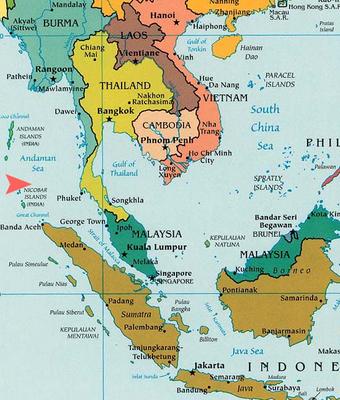
New sea lanes are hard to come by, but India is planning ahead (as is China, the US, Thailand...) for the possibility of a canal dug through Thailand, as reported here
"But the fact with things like the Kra canal, the Andaman and Nicobar islands will come into play," he said.Hmmm.
Plans to dig a canal across the narrow Kra isthmus in southern Thailand have been bandied about for more than 300 years.
The idea has some support among Thai politicians but has stalled over the huge potential costs and environmental impact. A railroad to carry oil across the isthmus has also been discussed.
Singh, who visited tsunami-hit areas of Thailand last week with his Thai counterparts, did not disclose any knowledge of fresh plans for a Kra canal.
But a report prepared for U.S. Defense Secretary Donald Rumsfeld, leaked to the Washington Post in January, said China was willing to underwrite construction of the $20 billion canal, complete with port facilities, as part of its "string of pearls" strategy of forward bases and energy security.
"So then you have an alternate route for shipping," Singh said in the interview held late on Wednesday at his headquarters atop a hill in Port Blair, capital of the Andaman and Nicobar islands. "It will be like another Suez Canal."
Red arrow on map points to area under discussion.
An effect of piracy- victims quit
Reported here:
Fishermen hunting for fish have now become the hunted with pirates robbing them of their catch at gunpoint. In the face of this danger, many fishermen already struggling to cope with the soaring oil price are hanging up their nets and turning to other means of livelihood.Law enforcement, anyone?
Ports after a storm: Post-Katrina testimony by New Orleans port chief

Must read here on post-disaster port operations and a request for meaningful federal aid to what, after all, are national assets:
(testimony of Gary P. LaGrange, President and Chief Executive Officer of the Port of New Orleans and Chairman of the American Association of Port Authorities) Within a one-month span, Hurricanes Katrina and Rita have impacted over twenty ports in the Gulf of Mexico that are members of AAPA, and many additional private and public ports in the region. The impact of these hurricanes has varied, with the largest impact on the ports of Louisiana, Texas, Alabama and Mississippi. For several ports, including New Orleans, the impact has been considerable; some of the facilities may need to be relocated, and it will take months if not years to fully recover. In New Orleans, for example, we are only 20% operational...If we are going to spend billions upon billions of federal tax receipts on rebuilding, early money should go to getting the affected Gulf Coast ports back into business.
...This nation is heavily dependent on maritime trade. America’s ports are our gateways to the world and a critical component in the nation’s economic health and national defense. When ports are impacted, there is a quick and sizable ripple effect throughout the economy. U.S. ports and waterways handle over 2 billion tons of cargo annually. Much of that commerce flows through the impacted ports in Louisiana, Texas, Alabama and Mississippi. These ports are heavily linked to this nation’s petroleum, grain and farm products, fruit, poultry, coffee, chemical and steel trades. The Port of New Orleans serves as the focal point for waterborne transportation of cargo to 28 states. That cargo activity supported $37 billion in economic benefits to the country and generated $2.8 billion in federal tax revenue.
Agricultural products from 17 Midwestern states flow through the Mississippi River. Over half of the grain exports for this nation depart from ports impacted by Katrina. Oil, agriculture and chemicals rely heavily on the infrastructure provided in these port areas. Additionally, these Gulf ports serve as one of the nation’s largest gateways for poultry exports, and the inability to handle frozen poultry products through unique dockside facilities would affect the industry worldwide. Estimates for the Port of New Orleans shows that relying on less efficient means to transport these products would increase costs by $7-to-$8/ton, thus making U.S. poultry products extremely noncompetitive in the international marketplace.
Steel is another commodity handled by the Port of New Orleans. The cost of diverting steel imports from New Orleans would increase the cost of such products by an estimated $80-to-$90/metric ton because of reduced access to inland barge and rail transportation systems and associated delay costs.
Cruises are also an important component of many ports activities, including the Port of New Orleans, which prior to Katrina was the fastest growing cruise port in the World. Cruises provide significant tourist trade, jobs and income for New Orleans and the region, and their rebound will depend heavily on the ability of New Orleans to rebuild.
Federal Assistance Important
Catastrophic events, whether natural or man-made, can greatly impact maritime trade. Hurricanes are especially dangerous and are the most frequent threat since ports are located in coastal areas. Ports also are impacted by other disasters, such as earthquakes and terrorist events. My written testimony today also includes some examples of lessons learned by ports from disasters prior to Katrina and Rita.
For Katrina and Rita, the impact on New Orleans has been considerable. There are several key things that are important to the port’s recovery: quickly reopening the channel; restoring communications; getting a power source (electrical or fuel-generated); manpower; and repairing facilities and intermodal connections (reliable truck and train traffic).
The Maritime Administration also should be commended. It took the historic step of diverting the military ready reserve ships to help ports get open quickly. Marad provided a ship in New Orleans where workers could live, since much of the city is still uninhabitable. The ship also had cranes and the ability to generate power for the port.
Several other federal agencies stepped in quickly to help out affected ports, and were critical to the ports’ ability to reopen quickly. The Coast Guard, the Corps of Engineers, and NOAA should especially be commended for their vital and timely assistance provided to ports by surveying channels, identifying any obstructions, reinstalling aids to navigation, and providing emergency dredging. These agencies worked quickly and cooperatively to reopen the channels.
FEMA is also an important partner. They direct many of the federal activities and help reimburse ports for rebuilding.
What are the challenges?
Hurricane Katrina completely shut down the Port of New Orleans. The port has limited electricity, water, sewage and other services, and its terminals and facility were severely damaged by both storms and subsequent flooding. The total closure of the port not only affected the economy of Southeast Louisiana, but also the entire nation. In 2004 alone, more than 380,000 jobs in the U.S. were dependent on the cargo activity at the port.With all the other issues swirling around the hurricanes, this one, to my mind, should be put front row center.
In the immediate aftermath of Hurricane Katrina and Rita, the Port of New Orleans has been working non-stop to restore its facilities and services. The port is currently operating at only 20 percent of its pre-Katrina level. The Port of New Orleans is still struggling with a limited workforce and the ability to move the cargo in and out of the port. Intermodal connections, such as truck and train, are still a challenge. Mississippi and some Texas ports face similar problems. The roads and rails need to be repaired and/or rebuilt, and workers need basic housing in order to work long-term. The recovery of the Port of New Orleans is tied to the problems of restoring the entire city. Without adequate infrastructure for longer term housing and family needs, workers will not be able to return. Cruises will wait to return until hotels and tourist attractions are restored.
Another challenge will be cleaning up the ports. In addition to wind damage, several ports impacted by Katrina and Rita have spoiled cargos that must be disposed of and storage sheds that must be replaced or repaired.
The port is a major economic engine for the city and the region. Quickly getting the port back in operation more fully will help return economic vibrancy to the area. The port will also be a critical part of rebuilding the city. It can provide a means of bringing in the materials needed for the major repair and reconstruction needed. Should port services not be restored, any rerouting of traditional port cargoes would increase related supply chain costs, includes those associated with trucking and rail services, barging, distribution and warehousing, and ocean freight.
Based upon post-Katrina engineering and other studies, the Port of New Orleans estimates that $1.7 billion will be required to rehabilitate, replace and/or improve port facilities damaged by Hurricanes Katrina and Rita. Other ports in Louisiana, Alabama, Texas and Mississippi also have costs to repair facilities. The Port of New Orleans is the primary economic engine for the region – and if the port returns to full operations, the region will soon follow. With repaired port and intermodal infrastructure and a return of the workforce, the port will be a major factor in the business and economic revitalization so desperately required for the Gulf Coast region.
Drawing is from Port of New Orleans website and show geographic distribution of American goods shipped from New Orleans. Previous posts on importance of the port: here, here, here, here, here, and here. It's like I think its important or something...
Wednesday, September 28, 2005
Latest ICC Commercial Crime Services Piracy Report (to 26 September 2005)
Piracy report of the ICC-CCS here: Highlight:
Marco! Polo!
10.09.2005: missing tug and barge
Tug Marco Polo 43 and barge Marco Polo 48 in tow from Gresik Java, Surabaya to Jakarta have gone missing since 10.09.2005.
Description:
Tug: Marco Polo 43, POR- Batam, callsign: YD3907, grt: 148, nrt: 88 Built-1992, loa: 23.34 m, breadth: 7.00 m, depth: 2.9 m
engine: Niigata - 1 x 1300hp, colour: superstructure/accommodation: beige/yellow, hull: blue
Barge: Marco Polo 48, flag: Indonesia, grt: 1704, loa: 68 m,
dimensions: 67.3 x 20.12 x 4.88 m, colour: sideboard – blue hull: black / rust
Anyone sighting the tug and or barge are requested to inform the piracy reporting centre.
Marco! Polo!
French Commandos Capture Ship from Hijackers
Reported here:
UPDATE: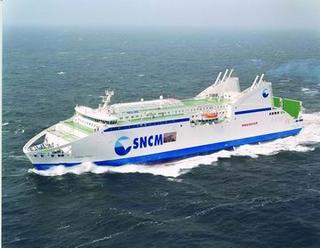
UPDATE 9/29/05: French government may cave to demands and protests as reported here. They even surrender on their own turf.
Hooded paramilitary gendarmes of an anti-terrorist unit, carried by five Puma helicopters, were lowered on ropes to take control of the Pascal Paoli cargo ship, belonging to the Societe Nationale Maritime Corse-Mediterranee, or SNCM, which serves Corsica and North Africa. The operation, in which maritime police also boarded, was shown on LCI all-news television.Will the "hijackers" be treated as pirates at their trial?
The ship was hijacked in Marseille by members of the Corsican Workers' Union, or STC, late yesterday and sailed to the French Mediterranean island of Corsica. It was heading into the northern Corsican port of Bastia when the gendarmes, who are under Defense Ministry command, went in. The ship then turned back toward the French mainland.
UPDATE:

UPDATE 9/29/05: French government may cave to demands and protests as reported here. They even surrender on their own turf.
Bangladesh: A sea battle with pirates
Anti-piracy effort in Bangladesh notedhere:
At least 15 pirates were killed and five Bangladeshi law enforcers wounded in gun battles in southern Bangladesh, police said on Wednesday.Arrgh!
The clashes occurred on Tuesday as police and coastguards pursued up to 50 bandits who had boarded two trawlers in the Meghna river close to the Bay of Bengal.
Tuesday, September 27, 2005
Somehow this just doesn't seem quite right
From the Popular Mechanics way back cover collection, a submarine to satisfy the "no new nukes" crowd:
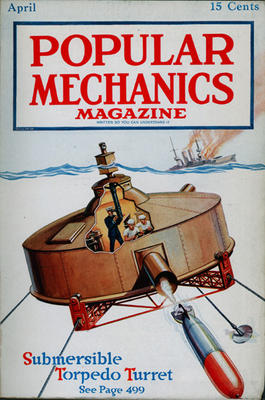

Stopping Nuclear Terrorism the PSI factor
Surprise? "U.S. Advocates Global Network To Head Off Nuclear Terrorism" it says here:
The task, he said, “is to understand the requirements of nonproliferation security in the post-9/11 era: to find ways to work together to mold an international order and create global systems that are strong … and connected enough to prevent global terrorists from acquiring or delivering a weapon of mass destruction.”"Bonner" is U.S. Customs and Border Protection Commissioner Robert Bonner.
The ultimate fear, Bonner said, is that there may be a nuclear weapon in a box traversing the seas or in the air hidden in a cargo container.
“Those containers could easily become bulky missiles – crude, but nevertheless, missile delivery systems.” That is why, he said, PSI can be viewed as “part of an anti-missile defense system.”
Even if the al-Qaida network does not have a nuclear weapon now, Bonner said, the reality is that PSI must be expanded to prevent the terrorists from obtaining such a weapon or the special nuclear materials to make one. Al-Qaida must be prevented from delivering a nuclear device, he said.
“Nothing is more important for PSI. Nothing is more important to homeland security and the security of the global economy,” Bonner said.
Simon says "Must read!" (and he's right)
Simon points to Spengler and says "Must read!"
From a great opening ("Whenever the government of the People's Republic of China agrees with the US State Department about China's internal affairs, it is a good bet that either both are wrong or that the matter is irrelevant."), we are guided along the road to Chinese democracy.
Read it. You have to do what Simon says, anyway.
From a great opening ("Whenever the government of the People's Republic of China agrees with the US State Department about China's internal affairs, it is a good bet that either both are wrong or that the matter is irrelevant."), we are guided along the road to Chinese democracy.
Read it. You have to do what Simon says, anyway.
Beware the Froggy: Calling BS by its real name
In the service, it's not uncommon for soldiers and sailors to while away their time converting past exploits into deeds both bold and brave. Virtually every such tale begins with the expression "Now, this is no s***" (Castle Argghhh! gets it as "TINS"). The exaggeration contest generally goes on until someone calls "Bull S***"
In his post here Froggy of Froggyruminations has appropriately called "BS" on the media for its willingness to accept, repeat and extrapolate on any wild rumor - especially those based on preconceived notions of "how things are." Froggy points out major culprits, identifies the bigotry that would allow unfounded rumors of murder, rape, pillage and mayhem to be repeated as fact, often and at top volume. He cites several examples of other tales seemingly swallowed whole by the most gullible media, like the "killer dolphin" saga (see my doubts expressed here). My comment on "first reports". Yes, I called BS, too, but Froggy did it much better.
Beware the Froggy!
UPDATE: Wait, I did call "BS" here (of course, I was responding to a slightly different package of baloney).
In his post here Froggy of Froggyruminations has appropriately called "BS" on the media for its willingness to accept, repeat and extrapolate on any wild rumor - especially those based on preconceived notions of "how things are." Froggy points out major culprits, identifies the bigotry that would allow unfounded rumors of murder, rape, pillage and mayhem to be repeated as fact, often and at top volume. He cites several examples of other tales seemingly swallowed whole by the most gullible media, like the "killer dolphin" saga (see my doubts expressed here). My comment on "first reports". Yes, I called BS, too, but Froggy did it much better.
Beware the Froggy!
UPDATE: Wait, I did call "BS" here (of course, I was responding to a slightly different package of baloney).
Sailing at 50 knots- Whoosh!

Once there was Babe Ruth's home run record. Until it became Hank Aaron's home run record. Once there was the 4 minute mile barrier. Until it became Roger Bannister's sub-4 minute mile mark. Once, the only things going 50 knots (about 57 miles per hour) on the water were high powered speed boats*. Now, the 50 knot barrier soon may be broken as Popular Science reports here. Weymouth Speed Week is coming. It runs from the 8th of October to Fri 14th of October 2005. Will the record be broken?
Composite materials, better understanding of the science involved and pretty soon, WHOOSH! high speed, very low drag sailing machines!
More on speed sailing here. Sample hull design from Monofoil (pictured) talking about speeds up to 70-80 knots here.
While it may appear surprising to some, we are not aiming at the 50 knot barrier. We believe the craft has potential to go considerably faster than this and will be very disappointed if it does not achieve a top speed in the range of 70-80 knots.
We believe we can achieve these speeds for the following reasons. The land and ice speed sailing records are 116mph and 143mph respectively. This shows that there is no energy restriction or limit on going faster than 50 knots. The normal failure mode of speed sailing craft is when a control surface fails to work. For example for a foil in water cavitation becomes more and more likely as you approach the present speed record. One approach is to try and delay this with a cavitation resistant foil profile. The cavitation causes a complete loss of lift for the foil and at the speeds involved can lead to sudden and often catastrophic failure.
* And a few hydrofoils, surface effect ships. air cushion vehicles, wing in ground aircraft - all powered by something other than the wind.
Background on Weymouth Speed Week here.
Monday, September 26, 2005
Interview of the Month
 Matthews
MatthewsThanks to Radioblogger for letting us read how the remarkably obnoxious Chris Matthews gets handed it to him by Rep. Peter King here:
Chris, you won't give me a chance to answer the questions. Just because the president doesn't watch you on television, it doesn't mean he's not doing his job. You know, Franklin Roosevelt wasn't hired to listen to radio accounts of D-Day. You're hired to do the job, and the president can do his job without having to listen to Chris Matthews or Andrea Mitchell or Tim Russert, or any of the others. He is doing his job.Ouch!
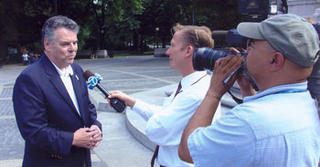 King
KingHat tip: Instapundit
New Jersey sues oil companies, gas stations, alleging price-gouging
New Jersey breaks the ice: State sues oil companies, gas stations, alleging price-gouging.
I am somewhat amused by the allegations of station owners ripping off their customers:
New Jersey filed suit against three oil companies and several independent gas station owners Monday, charging them with gouging motorists during Hurricane Katrina.Motiva Shell is a partnership between Shell and Saudi Oil.
The lawsuits, filed in Mercer County Superior Court, charge Hess, Motiva Shell and Sunoco with artificially inflating gas prices and for increasing prices more than the once-a-day legal limit. Independent gas station operators selling Hess, Shell, Sunoco and Citgo brands were also sued.
Specifically, the defendants are charged with violating the state's motor fuels and consumer fraud acts through their pricing practices.
I am somewhat amused by the allegations of station owners ripping off their customers:
The complaint also alleges that the defendants engaged in "unconscionable practices," which Harvey said included charging motorists' credit cards for more gasoline than they received. He said the suit seeks restitution for customers who were overcharged.Amused only because New Jersey is one of the two states (along with Oregon) where it is illegal to pump your own fuel and thus be absolutely certain what grade and amount are put into your tank. Heck, in most places you can even get a receipt from the pump and can immediately double check your purchase. An explanation for the New Jersey law is not really too complimentary to the residents of the state:
Another bogus practice was to charge drivers for higher octane gas while filling their tanks with lower octane fuel, Harvey said.
The ban on self-service gas stations is a highly combustible issue and makes for some heated debates. New Jersey passed the law making it illegal to pump your own gas in 1949. At the time, legislators felt it was too dangerous to have untrained people dispensing such a flammable liquid.You might add to the mix that it makes it easier for station operator or his minions to cheat you. Not that it has ever happened in New Jersey.
That may have been sensible at the time, but pumping gas is much safer today, and some motorists feel the ban is outdated and needs to go. Opponents of the law argue that removing it would lower the cost of gas and make refueling much quicker and more convenient. Proponents of the ban argue that it creates jobs and customers like full service.
An old story: Mississippi flooding
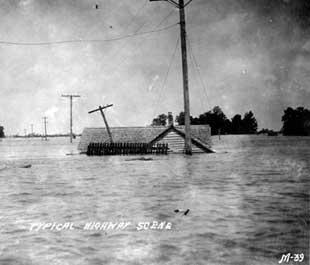
Since history doesn't seem to be America's strong point, it's good to visit this site, which deals with the Great Mississippi Flood of 1927. Levee breaks, Army Corps of Engineer plans to control the river, racism, presidential politics - it's all there. Don't miss the "timeline" section (the first levees in New Orleans were built in 1726!)
Native Americans told the first European explorers to expect the Mississippi River to flood every 14 years. Since then, every generation of settlers to the region has attempted to control the river by building levees, or protective, raised embankments, alongside it. Prior to 1882, Mississippi Delta planters had to rely on their own efforts to build and maintain levees. But local efforts were not always effective. They needed a more advanced levee system, and for that they turned to the federal government.Tragic mistakes.
I remember seeing the show on PBS and highly recommend it to you (it may be available for rent). Also of interest is the book by John M. Barry, Rising Tide: The Great Mississippi Flood of 1927 and how it Changed America (1997) as noted in this review:
In the final part of Rising Tide, Barry explores the role of powerful New Orleans families during the 1927 flood. Entitled the "The Club," Barry conveys a sense of mystery surrounding both the city and the men that controlled it. Barry notes that three men controlled the newspapers in the city and they cooperated in suppressing news unfavorable to the city's business interests. But membership in the all-male social clubs of New Orleans determined who the real insiders were and who made the important decisions. The driving force behind these clubs was the New Orleans banking establishment. Barry writes that the city had nearly twice the economic activity of Dallas and between double and triple that of Houston, Atlanta, Memphis, Louisville, Richmond, or Birmingham. This power led to these clubs having immense control over all New Orleans activities, particularly economic and political decisions.While some things have changed, much remains the same.
In the late 1920's, New Orleans was controlled by powerful banking families, all members of the clubs, who exerted enormous control over business and political decisions affecting the city. As a result of having this power, members of these clubs decided to intentionally dynamite the levee to lower the flood level in New Orleans and protect the commerce of the city. The Corps originally proposed destroying the levee in the wake of the 1922 flood when they advised the New Orleans financial community that, if the city was ever seriously with a flood, blowing a hole in the levee would save the city. In the end, the decision to dynamite the levee was made by three New Orleans banking leaders in the boardroom of the Canal Bank. Unfortunately, the result was the flooding St. Bernard and Plaquemines parishes. Barry sadly notes, as two engineers had predicted, the destruction of the parishes was unnecessary and one day's wait would have shown it to be so.
US and Indian Aircraft Carriers Operating Together

As part of an exercise, USS Nimitz and INS Viraat are operating together in the Indian Ocean as seen here. Photo caption:
Ships assigned to the USS Nimitz Carrier Strike Group and the Indian aircraft carrier Viraat (R 22) underway in formation as part of exercise Malabar 2005. The exercise is designed to increase interoperability between the two navies while enhancing the cooperative security relationship between India and the United States. The at-sea exercise includes maritime interdiction, surface events, sub-surface, air events and personnel exchanges. U.S. Navy photo by Photographer's Mate 3rd Class Shannon E. RenfroeNimitz and Viraat are in the center of the formation. Nimitz is on the left.
Oh, goodie! Venezuela eyeing Russian submarine purchase

Reported here:
Venezuela is reportedly planning to buy three Russian submarines to modernise its navy's fleet in the latest potential military deal between the two countries.Details on Amur (NATO "Lada" class) here and here. Sub picture from here.
Venezuela is set to purchase three Amur-class submarines to replace its German Type 209 submarines, the Russian news agency RIA-Novosti reported Sunday.
The diesel-electric submarines are equipped with an anti-ship weapon system that enables the vessels to fire Club-S missiles and torpedoes from 10 torpedo tubes in the bow, RIA-Novosti said.
Venezuela's state-run Bolivarian News Agency reported last week that the navy was also seeking bids from the governments of South Korea, China and France.
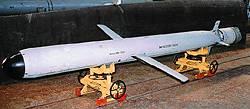
Info on "Club" missiles here:
The Club missile system is designed to destroy submarine and surface vessels and also engage static/slow-moving targets, whose co-ordinates are known in advance, even if these targets are protected by active defences and electronic countermeasures.Obviously, these weapons will stave off the looming threat posed to President of Life Chavez by US forces in Paraguay.
Thanks to Mudville Gazette Open Post.
UPDATE: Of course, sub blogger Bubblehead got the story first.
Latest ONI World Wide Threat to Shipping (21 September 2005)
For the latest Office of Naval Intelligence Threat to Shipping report, go here and click on the date. Highlights:
1. Discussion of maritime insurance covering piracy
2. Discussion of maritime insurance covering ransom
3. Long but good report on the World Food Program ship Semlow and her current status (but no mention of seizure, by same pirates, of a ship carrying cement (as reported here).
STAY AWAY FROM SOMALIA!
1. Discussion of maritime insurance covering piracy
2. Discussion of maritime insurance covering ransom
3. Long but good report on the World Food Program ship Semlow and her current status (but no mention of seizure, by same pirates, of a ship carrying cement (as reported here).
STAY AWAY FROM SOMALIA!
Why should you discount "first reports?"
It's a common bit of military wisdom that "first reports are often wrong."
Why?
Because things get exaggerated in minds of the first people on a dramatic scene and sudden rumors or words misunderstood lead to confusion (face it, if you are getting shot at, you tend to feel the whole world is shooting at you even if it's just a minor skirmish). It sometimes takes cooler heads to sort out the real from the reported. Which is why an experienced military leader will help train his people in making factual, non-hysterical reports he can rely on, and why pilots often have that really calm sounding voice (the "Chuck Yeager" voice) as things are going bad around them - it's a trained skill in keeping calm and focused.
Remember all those horror tales out of New Orleans? This article is a fine example of what happens when reality catches up with a "first report":
Why?
Because things get exaggerated in minds of the first people on a dramatic scene and sudden rumors or words misunderstood lead to confusion (face it, if you are getting shot at, you tend to feel the whole world is shooting at you even if it's just a minor skirmish). It sometimes takes cooler heads to sort out the real from the reported. Which is why an experienced military leader will help train his people in making factual, non-hysterical reports he can rely on, and why pilots often have that really calm sounding voice (the "Chuck Yeager" voice) as things are going bad around them - it's a trained skill in keeping calm and focused.
Remember all those horror tales out of New Orleans? This article is a fine example of what happens when reality catches up with a "first report":
Of those, four died of natural causes, one overdosed and another jumped to his death in an apparent suicide, said Beron, who personally oversaw the turning over of bodies from a Dome freezer, where they lay atop melting bags of ice. State health department officials in charge of body recovery put the official death count at the Dome at 10, but Beron said the other four bodies were found in the street near the Dome, not inside it. Both sources said no one had been killed inside.Be very cautious in accepting first reports unless you know the source and can trust the source. And the media might want to work on a little training in not passing on rumors and learning a little control.
At the Ernest N. Morial Convention Center, just four bodies were recovered, despites reports of corpses piled inside the building. Only one of the dead appeared to have been slain, said health and law enforcement officials.
That the nation's front-line emergency management believed the body count would resemble that of a bloody battle in a war is but one of scores of examples of myths about the Dome and the Convention Center treated as fact by evacuees, the media and even some of New Orleans' top officials, including the mayor and police superintendent. As the fog of warlike conditions in Hurricane Katrina's aftermath has cleared, the vast majority of reported atrocities committed by evacuees have turned out to be false, or at least unsupported by any evidence, according to key military, law enforcement, medical and civilian officials in positions to know.
"I think 99 percent of it is bulls---," said Sgt. 1st Class Jason Lachney, who played a key role in security and humanitarian work inside the Dome. "Don't get me wrong, bad things happened, but I didn't see any killing and raping and cutting of throats or anything. ... Ninety-nine percent of the people in the Dome were very well-behaved."
Sunday, September 25, 2005
Somali pirates capture another ship
The Somali pirates who have been holding a World Food Program ship have added to their inventory by seizing a cement ship as reported here:
Pirates who have held a UN-chartered ship and its crew hostage for nearly three months have captured a second vessel carrying cement from Egypt, days after the collapse of efforts to release the first merchant ship and its load of food aid.
The pirates hijacked the second vessel while it was sailing from El Maan, a port north of Somalia's capital of Mogadishu.
Local authorities expelled the Somali hijackers from the port on Thursday after they raised fresh ransom demands and refused to meet the deadline to release the ship, its crew and cargo.
"The hijackers contacted us only this morning, telling us that the ship ... was under their control," said Abdi Rahman Kariin Olow, a Mogadishu-based businessman who owns part of the cement shipment.
"The hijackers let us speak with the captain of the vessel who also confirmed they had been taken hostages," he said.
I'll bet this is just...wrong
Navy sea mammal warriors on the loose? Doubt it. And I bet this article is nonsense. 
UPDATE: The "source" for this nonsense about "dart armed dolphins" has a spotty record:
UPDATE 2: This silly rumor is spreading to the gullible, like this post at the land of the lost Huffington Post.
And here's another load of baloney: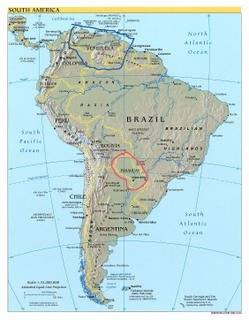
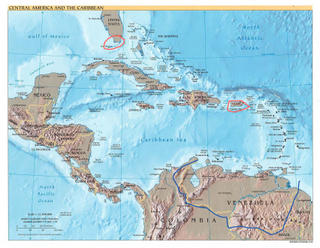
Let's see, distances Asuncion, Paraguay to Caracas, Venezuela- 2500 miles. San Juan, Puerto Rico to Caracas - 550 miles. Miami, Florida to Caracas - 1400 miles. Now explain to me why a base farther away from Venezuela than US territory would be used to stage an attack? Especially one that would require the creation of infrastructure. Does the guy who wrote this garbage own a globe? You know, some things just don't pass the smell test. Just President for Life Chavez paranoia.
Another report mentions the war on terror:
UPDATE: The "source" for this nonsense about "dart armed dolphins" has a spotty record:
Worrying to be sure. We find, however, that Sheridan has made sport of gullible reporters in the past. In 2003, he was confident that he and a team of divers he advised had located the site where English aviator Amy Johnson died, after her plane went into the sea off Kent in 1941. The Guardian carried that item too. Not surprisingly, there has been little news about Johnson's plane since the announcement.
He also appears to have been confident, back in 1998, that a group of US Navy killer dolphins had come to grief off the French Mediterranean coast when they got loose and their handlers detonated a "radio-controlled explosion of their signal collars, so that no one could find out their missions." (Find out their missions?)
UPDATE 2: This silly rumor is spreading to the gullible, like this post at the land of the lost Huffington Post.
And here's another load of baloney:
The neocons also want to access the vast resources of the region ... they also want to use Paraguay as a launching pad along with Colombia to invade Venezuela.


Let's see, distances Asuncion, Paraguay to Caracas, Venezuela- 2500 miles. San Juan, Puerto Rico to Caracas - 550 miles. Miami, Florida to Caracas - 1400 miles. Now explain to me why a base farther away from Venezuela than US territory would be used to stage an attack? Especially one that would require the creation of infrastructure. Does the guy who wrote this garbage own a globe? You know, some things just don't pass the smell test. Just President for Life Chavez paranoia.
Another report mentions the war on terror:
With Bolivia’s recent uprisings, their enormous gas reserves, and a presidential election on the way, some observers suggest this military activity could pave the way for U.S. intervention. Rumors are circulating that al-Qaeda has a training base near Paraguay, a situation that would help to make a case for more aggressive military action in the region.Technorati tag: dolphins
Saturday, September 24, 2005
Photo of the Month!
Hats off to Chapomatic for letting us all share the photo he posted here!
(and a hat tip to Mudville Gazette.)
(and a hat tip to Mudville Gazette.)
Friday, September 23, 2005
New York City Firemen and Marines
News from here:
The signs of a true crisis proliferated, from the dozens of firefighters and Marines on the scene to the bulky figures wearing airtight suits and gas masks to the bodies stretched out on gurneys.
Even the setting of Friday's joint exercise in preparing for a potential radiation leak on a ship -- a Brooklyn pier with a view of lower Manhattan -- seemed ominous.
USNS Comfort having trouble in heavy weather
Reported here:
Rough seas left some crewmembers of the USNS Comfort with minor injuries this week.
The Baltimore-based hospital ship is experiencing rough seas in the Gulf of Mexico, where it deployed late last month to aid in the recovery efforts of Hurricane Katrina.
A member of the ship's command told 11 News that four crewmembers were hurt when they were tossed around the ship. The ship is only functioning on one boiler because the other was damaged.
Idaho Weather Guesser Leaves Job to Find Weather Conspiracy
The Idaho weatherman who has alleged that hurricane Katrina was part of a Japanese mafia plot to attack America has resigned to pursue his real interest, finding the conspiracy that is using the weather as a weapon, it says here
Previous posts on this clown - uh -deluded fool- here and here.
Does anyone remember that there were hurricanes long before there was a Russia or even a United States? The Galveston hurricane of 1900 and the storms that wrecked so many ships off North Carolina's Outer Banks ring any bells?
UPDATE: Just in case you wonder what his evidence is, you can visit his website which consists of odd ramblings and pictures of aircraft contrails and some old pictures like this one:
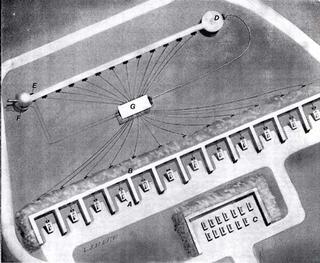
It is supposed to be an artist's rendition from Aviation Week & Space Technology July 28, 1980:
Since I' m getting a lot of hits from people searching for "Russian Weather Machine," let me make it clear that I think this theory is complete and utter nonsense.
UPDATE 2: More nut cases: It's "bad weather for oil profits" here and conspiracy theories run wild here. More fun here with (shh!) HAARP. Gotta like the comments. And yet more on Tesla howitzers and earthquake and weather control here - which also reports the Chernobyl disaster was caused by an American defense system...
Oh, please. Just cue the theremin music (which was the product of Russian research, too, oooh, oooh!).
UPDATE 3: Speaking of wack jobs, let's here it for Rep. Charles Rangel who has apparently decided that history is reversing itself in some sort of Tesla SCALAR induced way as reported here:
The good Sister Toldjah also reports a spanking of Mr. Rangel by some people more rooted in reality:
Since Katrina, Stevens has been in newspapers across the country where he was quoted in an Associated Press story as saying the Yakuza Mafia used a Russian-made electromagnetic generator to cause Hurricane Katrina in a bid to avenge the atomic bomb attack on Hiroshima. He was a guest on Coast to Coast, a late night radio show that conducts call-in discussions on everything from bizarre weather patterns to alien abductions. On Wednesday, Stevens was interviewed by Fox News firebrand Bill O'Reilly.Anyone surprised that there's money in being a nut job? Anyone? Bueller?
Stevens said he received 30 requests to do radio interviews on Thursday alone.
Fouch said Stevens wanted to leave as quickly as possible because his "plate is full," and he needs to take advantage of the opportunities that exist now.
Stevens said he's received offers that he's not at liberty to discuss.
Previous posts on this clown - uh -deluded fool- here and here.
Does anyone remember that there were hurricanes long before there was a Russia or even a United States? The Galveston hurricane of 1900 and the storms that wrecked so many ships off North Carolina's Outer Banks ring any bells?
UPDATE: Just in case you wonder what his evidence is, you can visit his website which consists of odd ramblings and pictures of aircraft contrails and some old pictures like this one:

It is supposed to be an artist's rendition from Aviation Week & Space Technology July 28, 1980:
Unfortunately, today in 1981 the Soviet Union has long since discovered and weaponized the Tesla scalar wave effects. Here we only have time to detail the most powerful of these frightening Tesla weapons -- which Brezhnev undoubtedly was referring to in 1975 when the Soviet side at the SALT talks suddenly suggested limiting the development of new weapons "more frightening than the mind of man had imagined." One of these weapons is the Tesla howitzer recently completed at the Saryshagan missile range and presently considered to be either a high-energy laser or a particle beam weapon, (See Aviation Week & Space Technology , July 28, 1980, pg. 48 for an artist's conception.)And I'll even give you a sample of his logic and writing style"
This nation has not faced an economic crisis like the one that Katrina will spark in the days and months ahead. But that is one of the reasons Katrina was absolutely guided along the path that we all watched. This path has resulted in maximum damage to the energy infrastructure, transportation infrastructure and to the psyche of those that remain susceptible to further storms this year and in the years to follow. Oh New Orleans!I love his "prediction." No much of a limb to climb out on is it? If it doesn't happen when he says - he just got the time wrong. If it does happen- well, move over, Jeane Dixon. And what does an earhquake have to do with a hurricane? Nothing, unless you have fervant imagination... a certain degree of paranoia and a complete lack of knowledge of history.
I fully expect one more 'event' this year to impact the United States. My gut feeling is that it will be an earthquake/volcanic event with intensity of at least 7.5 in magnitude resulting in insured losses to exceed $25 billion. Where will happen? My gut says the Western United States.
Protect your family's wealth with precious metals as the cascading effects from this disaster and from poor government fiscal management, which have just begun to be felt worldwide.
My prayers go out to all who need a helping hand in the very difficult times ahead. The amount of social change that this storm has begun to unleash upon the fabric of American society is just now being grasped by the media, they are always a little slow to pick up on things, but then what's new! Oh how we long for a truly free press.
Since I' m getting a lot of hits from people searching for "Russian Weather Machine," let me make it clear that I think this theory is complete and utter nonsense.
UPDATE 2: More nut cases: It's "bad weather for oil profits" here and conspiracy theories run wild here. More fun here with (shh!) HAARP. Gotta like the comments. And yet more on Tesla howitzers and earthquake and weather control here - which also reports the Chernobyl disaster was caused by an American defense system...
Oh, please. Just cue the theremin music (which was the product of Russian research, too, oooh, oooh!).
UPDATE 3: Speaking of wack jobs, let's here it for Rep. Charles Rangel who has apparently decided that history is reversing itself in some sort of Tesla SCALAR induced way as reported here:
Comparing President Bush to the Birmingham, Ala., police commissioner whose resistance to the civil rights movement became synonymous with Southern racism, Rep. Charles Rangel said yesterday of the president: "George Bush is our Bull Connor."You just never know where the loonies are going to pop up next, do you?
The good Sister Toldjah also reports a spanking of Mr. Rangel by some people more rooted in reality:
Members of the black leadership network Project 21 are demanding that the Congressional Black Caucus (CBC) and Sen. Hillary Clinton (D-N.Y.) join with them in condemning remarks made by CBC member Rep. Charles Rangel (D-N.Y.) in which he called President George W. Bush "our Bull Conner," referring to the 1960s segregationist icon.
"Charles Rangel’s comments are morally vacant and beneath the pale, but obviously not out of character for him and his supporters," said Project 21 member Mychal Massie. "How many blacks today suffer from beatings, fire hoses or have dogs set on them for trying to seek a seat at a lunch counter or go to school? How many of us today are living under inflexible, legislated segregation?"
Massie adds: "Rangel’s comments may play well with those who embrace ignorance, but it will not resonate with Americans who eschew racial demagoguery. We demand that the CBC and Senator Clinton join with this overwhelming majority of their fellow citizens in banishing hate speech such as this to the trash heap of history."
Seattle area: More Homeland Security Training
Reported here:
If you happen to see what looks like a speedboat ramming a state ferry and exploding in Elliott Bay on Sunday morning, don't be alarmed - it's only a test.
More than a dozen federal, state and local agencies will simulate a terrorist attack on an out-of-service ferry heading to Coleman Dock from Bainbridge Island.
The training exercise, scheduled for between 8 and 11 a.m., is designed to test a newly formulated response plan for terrorist attacks on the water. It also will test the ability of many agencies to work together.
'For us to be able to play and drill so that we can respond, we have to make this as realistic as possible,' said A.D. Vickery, assistant chief of the Seattle Fire Department.
The Seattle event will be the most visible of four exercises Sunday in the Puget Sound area. Tacoma will simulate an explosion inside a cargo container. Two other 'table-top' scenarios will be simulated by officials but won't involve people in the field: terrorists taking over a cruise ship and releasing a biological toxin, and the discovery of a motorboat packed with explosives.
Indian and US Navy Joint Exercise includes aircraft carriers & more
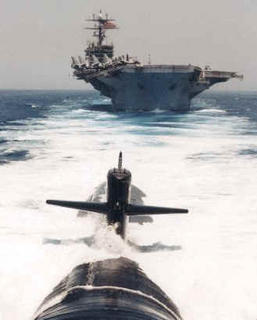 USS Nimitz
USS Nimitz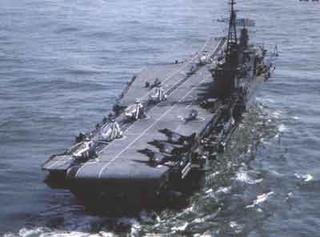 INS Viraat
INS ViraatThe budding strategic relationship between India and the US continues with a new round of joint exercises, this time invloving aircarft carriers and increasing complexity:
The cooperation between the US Navy and Indian Navy has moved apace with the relationship between the two countries in the recent years. Seven such exercises have been held so far. The process has been characterised by service-to-service interaction, high-level visits, joint exercises of increasing scope and complexity, and significant co-operation in the field of military training. The ongoing operational interaction between the navies of India and the USA stems from an institutionalised roll-on plan, which is determined and reviewed in successive meetings of the Executive Steering Group. This will be the first time that aircraft carriers from the two navies will participate in the Malabar series of exercises. The thrust of Exercise Malabar this year will be on aviation inter-operability, advanced anti-submarine warfare, sea control missions, fleet air defence, surface firings, maritime interdiction and VBSS (Visit Board Search and Seizure) operations towards anti-piracy and counter terrorism actions at sea. In order to streamline interoperability and derive maximum training value from such exercises, the two navies had evolved Standard Operating Procedures (SOPs), which are regularly tested and updated during these bilateral exercises.More information here,
India has also been working with Thailand as reported here: "The exercise, to enhance '"mutual understanding and inter-operability', also focussed on steps to prevent smuggling, piracy, drug trafficiking, illegal fishing and illegal immigration..."
Thursday, September 22, 2005
Middle East Maritime Security Brief
From DoD News: Defense Department Briefing :
Q Admiral, Al Pessin with Voice of America. On your deterrence of drug smugglers and terrorists, can you give us some idea how big an issue this was, say, a year or so ago versus what you're seeing now that you're having this impact?Interesting.
ADM. NICHOLS: Well, we don't know what we don't know, Al, is kind of the short answer of where we were a couple, three years ago. You know, prior to 9/11, we really hadn't leaned into this problem very much. Most of the maritime ops in the region here were focused on pre-OIF U.N. sanctions--maritime interdiction primarily against illegal Iraqi -- or oil that was being illegally smuggled out of Iraq. And while there was some focus on terrorist activity, it wasn't really looked at in an integrated way the way we do it now.
But I also say this: Based on what we have learned over the last year and a half to two years, we don't think that the maritime environment is routinely being used to move terrorists or terrorist-related equipment around the region. And again, we think it's partly because of deterrent effects that we've had; it's also because of our teaming with people ashore, such as Joint Task Force Horn of Africa, we work closely with MND-Southeast, and then coordinating and complementing our operations with other countries here in the region. So I can't put a number on it for you. One thing we have going in the headquarters is a process of campaign analysis which we're finishing up so we can better understand and quantify the kinds of issues that your question implies.
Senator Clinton says "No" to Roberts Knowing it Doesn't Matter Except to Her Base

Drudge has it here:
...I believe I must vote against his confirmation. I do not believe that the Judge has presented his views with enough clarity and specificity for me to in good conscience cast a vote on his behalf...(blah, blah, blah) Since I expect Judge Roberts to be confirmed, I hope that my concerns are unfounded and that he will be the kind of judge he said he would be during his confirmation hearing. If so, I will be the first to acknowledge it. However, because I think he is far more likely to vote the views he expressed in his legal writings, I cannot give my consent to his confirmation and will, therefore, vote against his confirmation. My desire to maintain the already fragile Supreme Court majority for civil rights, voting rights and women's rights outweigh the respect I have for Judge Roberts's intellect, character, and legal skills.Translation: "The legislative power of the Supreme Court must be kept intact at all costs, especially as it relates to abortion, which is the one common ground all those who might vote for me have. Therefore, now that I know he will win, I will announce my "no" vote and get a lot of publicity for my cheap political ploy. Winning, after all, is the only thing."
Seantor Clinton's website.
USNS Comfort asked to take on New Orleans Charity Hospital work

Found here:
Officials of Louisiana State University health care system asked the federal government Tuesday for mobile military medical units to provide health care for the poor in hurricane devastated parts of the state until new hospitals can be built in New Orleans and Baton Rouge.(Hat tip: NOSI).
In meetings with Bush administration officials and Louisiana lawmakers, the LSU officials asked that the Pentagon provide the USS Comfort, a Navy hospital ship, to serve as an immediate, temporary replacement for Charity Hospital, the primary health care facility for New Orleans' indigent population.
Dwayne Thomas, chief executive officer of Charity, said the officials also asked for portable military medical field hospitals that could be brought in once the Comfort leaves to provide health care for the city's poor until space can be leased elsewhere or a new hospital is built.
A Sensible Approach to Maritime Security
Offered up by the Heritage Society: Taking a Global Approach to Maritime Security.
While terrorists could use a cargo container to launch an attack on the United States, it is neither the most likely nor the most probable means of attack. Instead of focusing on preventing a low-probability attack, the United States could better secure itself by taking a global approach to trade security. The ISPS Code, C–TPAT, and CSI are all good and cost-effective components of a larger trade security strategy.
Now the U.S. needs a comprehensive approach to supply-chain security that includes these com ponents and strengthens them by better integrating commercial information and intelligence.
Somali Pirates Take World Food Program Ship to Sea Again
Reported here, the Somali pirates holding UN World Food Program ship and its crew have renounced all deals and taken the ship to sea again continuing the 90+ day saga.
In what appeared to be a deal to end the standoff in the lawless Indian Ocean waters off Somalia, the militiamen on Monday brought the boat into El Maan port, north of Mogadishu.
But on Thursday, the ship left again with the food and hostages on board after the pirates apparently issued new ransom demands to the Kenyan shipping agent leasing the vessel.
"It got so close, I really thought we were coming to an end of this," WFP spokesman Robin Lodge told Reuters in Nairobi.
"But they have made new financial demands...The port authorities said they would not allow the ship to stay, so they left this afternoon, in the direction of Mogadishu it seems."
Rita Coverage

For Hurricane Rita coverage that seems a lttle less hysterical than the CNN/FOXNEWS/MSNBC irritation, I suggest the Houston Chronicle.
Has some good interactive maps, too.
And not one word on "Russian Weather Weapons" or even (shhh!) HAARP.
NOAA strike probablity image from here.
The War in Iraq
Read Chester for a superb analysis of information on warfare in Iraq as we are seeing it develop between the participants and those close to them and the regular media.
Another must visit is Bill Roggio's post on recent Iraq operations- a flash presentation that lays out the pattern of ops the way a good brief should (and the way no one minute soundbite on network television never will). Couple it all with regular visits to the MilBlogs and you'll get a deeper, richer picture of the complexities and routineness of war, soldiers and the lives they lead.
Go - now.
Another must visit is Bill Roggio's post on recent Iraq operations- a flash presentation that lays out the pattern of ops the way a good brief should (and the way no one minute soundbite on network television never will). Couple it all with regular visits to the MilBlogs and you'll get a deeper, richer picture of the complexities and routineness of war, soldiers and the lives they lead.
Go - now.
Wednesday, September 21, 2005
Wacky Weather Theory: Japanese Mafia Using Russian Weather Machine to Make Hurricanes
Okay, with Rita bearing down on us try this wacky theory for Katrina:
I also wonder where the dolts who were blaming the tsunami on some US action offshore Indonesia are now? I'm sure they believe it's a plan to raise OIL prices, after all...

Or, maybe it's all related to the headline I saw today in the store from Weekly World News: "Einstein's Brain Comes to Life...and goes on rampage!" Perhaps part of the rampage includes generating massive hurricanes...
Of course, they also report: "SCIENTISTS REVEAL LAWYERS & LEECHES HAVE IDENTICAL GENETIC MAKEUP!"
Hmmm.
UPDATE: Or maybe it's all related to this:
UPDATE 2: A more mundane explanation of hurricane causation here.
An Idaho weatherman says Japan's Yakuza mafia used a Russian-made electromagnetic generator to cause Hurricane Katrina in a bid to avenge itself for the Hiroshima atom bomb attack -- and that this technology will soon be wielded again to hit another U.S. city.He may be the same nut job quoted in my previous post on a goofy Katrina theory here. That guy blamed it directly on the Russians, though, asserting that they can ship weather from Siberia to affect the US. Of course, Siberia is not noted for its warm climate and hurricanes develop over warm water, so the science is a little fuzzy to me, and apparently to real scientists, too.
Meteorologist Scott Stevens, a nine-year veteran of KPVI-TV in Pocatello, said he was struggling to forecast weather patterns starting in 1998 when he discovered the theory on the Internet. It's now detailed on Stevens' Web site, www.weatherwars.info, the Idaho Falls Post Register reported.
Scientists discount Stevens' claims as ludicrous.
I also wonder where the dolts who were blaming the tsunami on some US action offshore Indonesia are now? I'm sure they believe it's a plan to raise OIL prices, after all...

Or, maybe it's all related to the headline I saw today in the store from Weekly World News: "Einstein's Brain Comes to Life...and goes on rampage!" Perhaps part of the rampage includes generating massive hurricanes...
Of course, they also report: "SCIENTISTS REVEAL LAWYERS & LEECHES HAVE IDENTICAL GENETIC MAKEUP!"
Hmmm.
UPDATE: Or maybe it's all related to this:
Dozens of people from Jacksonville to Ft. Pierce flooded the U.S. Coast Guard late Tuesday with calls about a mysterious ball of fire seen flying in the sky...
UPDATE 2: A more mundane explanation of hurricane causation here.
Quick take on maritime security
Easy read on the challenges of Maritime Security here:
Overall, however, the looming threat of a terrorist disruption to the shipping industry or interior supply chain has not impeded commerce. "For the vast majority of vessels coming into our ports, it's business as usual," Collins said, adding that only about 1% of ships doing commerce in U.S. ports has been ordered out of port over the past few years.Admiral Collins is the Commandant of the Coast Guard and is younger than some of his ships.
"Our nation needs the right tools to mitigate risk, and this means prudent investment in security systems," Collins said, adding that he knows the challenges of keeping an infrastructure up to date. "I have several ships that are old enough to collect Social Security."
Oil shale again

Instapundit and Autin Bay touch on shale oil based on this Denver Post article.
See my earlier posts here and here.
Colorado resident Stygius reported on oil shale back in June here and includes a link to an NPR Morning Edition piece that points out that it takes energy to retrieve energy, which, incidentally is one of the lessons found in The Bottomless Well: The Twilight of Fuel, the Virtue of Waste, and Why We Will Never Run out of Energy by Peter Huber and Mark Mills( Amazon info here).
UPDATE: Mark in Mexico and some science of oil shale.
Shark Jumping proof: Sheehan's "Big Crowd"
Need more proof the "shark has been jumped?" Try this letter to The News & Observer of Raleigh here, accusing the paper of underreporting the crowds at recent Cindy Sheehan rallies about town:
My son's last recreational soccer game probably had over 100 people present, counting players, officials, coaches and families. I guess I should write the N&O and complain about it not covering such a "major" event.
UPDATE: Well, she also managed to draw 150 people in New York City, as noted here (Hat tip to Attila at Pillage Idiot). Apparently her comments did not include. "What do you mean my 15 minutes are up?"
Your Sept. 16 coverage of Cindy Sheehan's visit to Raleigh did a disservice to your readers. Many more people showed up to support Sheehan than you reported.The Triangle area, of which Raleigh is the largest city, has about 1.5 million residents. Of these, it is asserted a total of 1,000 showed up to 3 events, including 2 events on the campus of NC State University, which has a student population of over 29,000. That's only about .067% of the local popluation if the letter's author is correct in her numbers. Heck, Ms. Sheehan didn't even draw 4% of the NC State student population if all of the alleged 1000 were State students. Given the presence of a number of other universities in the area (University of North Carolina at Chapel Hill, Duke University, NC Central U., Shaw University and several others, it's a pretty pathetic showing.
You describe a modest turnout of 100 at Moore Square. We estimate there were at least 200 there and another 150 on the Brickyard at N.C. State University. You didn't mention how many attended the event at the McKimmon Center, where we distributed 750 programs. In total, at least 1,000 supporters greeted the Bring Them Home Now Tour.
Your photographs continued this bias. Two of your three photographs show pro-war protesters screaming at Sheehan's supporters, making it look as if the crowd was evenly divided. In fact, there were two or three protesters for every 100 supporters.
My son's last recreational soccer game probably had over 100 people present, counting players, officials, coaches and families. I guess I should write the N&O and complain about it not covering such a "major" event.
UPDATE: Well, she also managed to draw 150 people in New York City, as noted here (Hat tip to Attila at Pillage Idiot). Apparently her comments did not include. "What do you mean my 15 minutes are up?"
USNS Comfort & Other Navy Ships Underway - Hurricane Avoidance
Reported here:
The hospital ship USNS Comfort (T-AH 20) departed Pascagoula, Miss., Sept. 20 after spending ten days providing medical and dental care, and disaster relief assistance to the citizens of Pascagoula and surrounding areas devastated by Hurricane Katrina.At least the Navy has a lot of assets available in the area if needed for Rita.
As Hurricane Rita approaches the Gulf of Mexico region, many Navy assets in the Gulf region are preparing to get underway to ride out the storm.
“Our ship must leave to be in a position to be out of the storm’s path in time,” said Ship's Master Capt. Tom Finger.
Tuesday, September 20, 2005
The pleasure boat threat
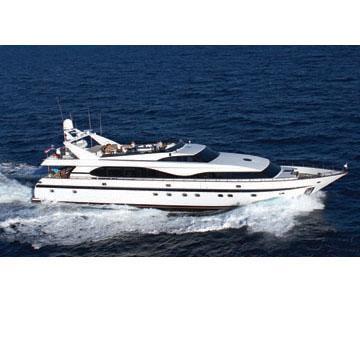 Terrorist weapon?
Terrorist weapon? Possible terrorist?
Possible terrorist?Well, see here:
The U.S. Coast Guard says millions of pleasure craft, fishing boats and ferries fall outside its security nets, hampering its ability to safeguard thousands of miles of coastline against terrorist attack.Well, uh...uh, I have not the foggiest. Must be time to infringe on some of that liberty.
"How do we include recreational boats _ some 58 million in this country _ into our security regime without infringing upon the liberty of boaters?" Admiral Thomas Collins, commandant of the U.S. Coast Guard, said Tuesday.
yacht beauty source. I trust she's using biodegradable soap.
Latest ICC Commercial Crime Services Piracy Report (to 19 September 2005)
Latest ICC-CCS piracy report here, not much in the way of piracy, several robberies. Curiously, no mention of the World Food Program ship still being held by Somali pirates.
Get ready for an oil "problem"
 Houston ship channel
Houston ship channel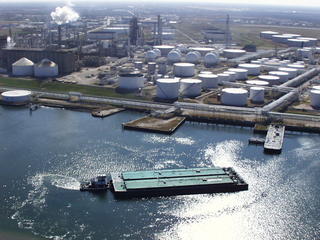


Scanning through cable TV and caught a nice discussion on CNBC related, I think, to this:
Rita was churning toward the Florida Keys this afternoon and could enter the Gulf of Mexico in the next few days and expand into a storm perhaps as dangerous as Katrina. Worse, it might come ashore in Texas or western Louisiana. That would threaten at least four major refineries and an oil and gas pipeline infrastructure that was hardly bothered by Katrina.More to the point,the Houston ship channel which runs from Galveston up to where Buffalo Bayou turns into a small river, is refinery dense, and there are refineries in Corpus Christi and all along the Texas coast, which means that given the lack of redundancy in refining, there could be another shortfall in refined products if Rita hits Texas hard. And, as the guests pointed out, there is also a shortage of oil tankers which could be used to import refined product from refineries in Europe. And the New Orleans and lower MIssissippi refineries could also be impacted.
The oil markets freaked. Crude oil jumped more than $4.35 a barrel or nearly 7% to $67.35, the biggest percentage change in crude oil ever. Gasoline, heating oil and natural gas prices all jumped more than 10%.
The stock market reacted badly. The Dow Jones industrials closed down more than 84 points, wiping out Friday's 83-point gain. The Dow had been down more than 110 points. The Standard & Poor's 500 lost nearly seven points, and the Nasdaq Composite gave up more than 15 points. Decliners outnumbered advancers 2 to 1.
A perfect storm. Nuclear power and electric cars anyone?
Photos of Corpus Christi ship channel (bottom 3) from here and the Houston picture from here. More when I can get the transcript.
UPDATE: Previous post on tanker shortage here and on refinery shortage here and here.
USNS Comfort and Crew Doing Good Work

USNS Comfort sailors build a clinic in Biloxi - Navy News release here:
Although Comfort staff will not be able to stay at the clinic very long, there will undoubtedly be a lasting affect on the area.
“The real good part about what we’ve done here is we’re leaving the local physicians with something to work with,” Dorrance said. “As far as having a long-term effect here, we will, because we are leaving behind this facility as well as all of the donated medical supplies.
"Most importantly, we got something started here. They will have somewhere they can go to receive medical treatment so they can feel better and start rebuilding their lives.”
Comfort is docked at Bayou Cassotte Pier in Pascagoula, Miss., and has been providing medical and hotel service to Katrina relief workers and area civilians who have been affected by Hurricane Katrina.
Comfort and its more than 700-person crew have seen more than 1,200 patients aboard and nearly 400 patients in their community outreach clinics ashore since arriving in the Pascagoula area Sept. 10.
Photo caption:
Biloxi, Miss. (Sept. 18, 2005) – U.S. Navy Hospitalman Apprentice Ryan Junkin, left, and Lt. Cmdr. Thomas Donahue, both medical staff stationed aboard the Military Sealift Command (MSC) hospital ship USNS Comfort (T-AH 20), construct supporting beams while building a triage clinic in Biloxi, Miss. Comfort is working in direct support of the Federal Emergency Management Agency’s effort to provide medical support and humanitarian aid in the Gulf Coast for victims of Hurricane Katrina. The hospital ship has treated more than 1200 patients since her arrival in Pascagoula, Miss., Sept. 9th. U.S. Navy photo by Journalist Seaman Heather Weaver
UPDATE: Froggy has more info on the Navy Special Warfare contribution to the Katrina effort that I had here.
UPDATE 2: More work that the public never sees:

Pensacola, Fla. (Sept. 15, 2005) - The minesweeper USS Scout (MCM 8) is assisted by a tugboat as it pulls alongside the Allegheny Pier on board Naval Air Station Pensacola. The Scout, along with the USS Defender (MCM 2), USS Gladiator (MCM 11) and USS Falcon (MHC 59) recently completed a survey of 938 nautical miles along the Louisiana coast following the aftermath of Hurricane Katrina. The U.S. Navy's involvement in the humanitarian assistance operations are being led by the Federal Emergency Management Agency (FEMA), in conjunction with the Department of Defense. U.S. Navy photo Gary NicholsThe survey is important to allow shipping, barge traffic, fishing, and other offshore activities to operate with some idea of what may have changed due to the storm.
Katrina: Potential litigation interfering with repair and clean up?
From this CNN story, those who wonder about the impact the litigation system on getting things done whould take note - it has a major effect:
For a related article on potential class action suits that could be filed on behalf of uninsured or underinsured homeowners see here. With billions of dollars at stake, there are a lot of lawyers who will be thinking creatively about how to get their share--I mean-- to help their clients.
UPDATE: And more food for thought here. What is the obligation of a hospital or even an employer in face of a foreseeable natural or terrorist attack? What are the limits of preparation that can be economically justified? And is the best place to find out in a courtroom - after the fact? And look at the last sentence in this quote to see if prospective litigation might make a difference in future planning:
UPDATE 2:
UPDATE 3: Fishermen sue BIG OIL as reported here:
UPDATE 4: Interesting to ponder this Class Action Lawsuit website with convenient fill-in-the=blank form for submitting a potential claim to whatever law firm (Mentz Law, LLC is the copyright holder) the page.
Also, Overlawyered.com notes some of the cases already filed.
The Washington Post reports that a trade group for contractors is drafting legislation to seek such protection from lawsuits over work to repair levees in New Orleans, pump water out of the city and other emergency repairs. The newspaper reports that the Army Corps of Engineers and the Federal Emergency Management Agency have relied on contractors, including several who started the emergency work without a contract.Asking any business to take on a set of unknown (perhaps unknowable) risks creates a certain level of instability in pricing the jobs and may limit the number of companies willing to undertake a job with potentially large downside...and what kind of premiums will insurance companies demand under the circumstances?
But the Post reports the contractors are worried about a repeat of lawsuits filed against construction firms that helped clean up the World Trade Center after the Sept. 11, 2001, terrorist attacks.
"We're asking for some reasonable limits for going into the Gulf Coast and dealing with unknowns," Michael Kennedy, general counsel for the Associated General Contractors of America, told the newspaper after a meeting of the trade group in Washington. "A contractor goes into an unknown situation to remove debris or fix a utility line, and three years from now someone decides they did it improperly."...The trade group's proposed legislation would limit contractors' liabilities but still hold them responsible for following government regulations, Kennedy told the newspaper. It would be similar to regulations the Homeland Security Department unveiled last year that protect companies selling security technology from lawsuits triggered by a terrorist act.
For a related article on potential class action suits that could be filed on behalf of uninsured or underinsured homeowners see here. With billions of dollars at stake, there are a lot of lawyers who will be thinking creatively about how to get their share--I mean-- to help their clients.
"From the viewpoint of mass tort law firms, this is a gift from heaven: a huge number of people who have suffered terrible losses, with 24X7 media exposure," said Donald Light, senior analyst at Celent, a global research and consulting firm.Laissez les bon temps rouler!
UPDATE: And more food for thought here. What is the obligation of a hospital or even an employer in face of a foreseeable natural or terrorist attack? What are the limits of preparation that can be economically justified? And is the best place to find out in a courtroom - after the fact? And look at the last sentence in this quote to see if prospective litigation might make a difference in future planning:
At least some people who died in the hospital probably would be alive if not for the conditions inside, said Richards, an expert in public health and emergency preparedness.
"Is that the hospital's fault for not getting them out? Or is that an act of God, and the hospital did admirable job under the circumstances?"
Tenet was drawn into the spotlight this week because one of its hospitals, Memorial Medical Center, was among the first to have bodies removed since its harried post-Katrina evacuation.
The 45 bodies were taken Sunday to the St. Gabriel morgue to await autopsies. The Louisiana attorney general's office plans to investigate the deaths, but has taken no other action.
Experts say that criminal action against the company may be unlikely due to its efforts to rescue the patients, their families and staff who were left stranded inside when government responders failed to materialize in force. Tenet hired a fleet of private helicopters to help extract the thousands of people stuck inside Memorial and other area hospitals.
But experts still anticipate civil lawsuits. Tenet may be a particularly rich target because it has been the subject of unrelated suits and government probes in recent years.
Any litigation could ultimately define the extent to which hospital owners rebuild their facilities in the region and residents' ability to receive medical care in a disaster-prone area.
UPDATE 2:
Some Louisiana homeowners sued 16 insurance companies Thursday, asking a state district court in the 19th Judicial District Court to rule that neglect and wind damage caused the flood that inundated thousands of homes in Orleans and Jefferson parishes.And a press release from the US Chamber of Commerce:
The lawsuit is different from those filed in Mississippi. That lawsuit contends that standard insurance polices led homeowners to believe they were covered for all hurricane damage, including that from high water.(source)
The U.S. Chamber Institute for Legal Reform (ILR) is warning that the financial devastation caused by Hurricane Katrina could be made worse by a rash of lawsuits that will delay and complicate recovery efforts for hundreds of thousands of the storms' victims. ILR urged citizens and government officials to work together to help the Gulf Coast region recover from this disaster, and not rush to the courthouse.Why are suits being filed so fast? In my experience, the lead lawyers in a class action suit are likely to gain financially from being in charge. Therefore, they race to the courthouse to be the first to file so they can be deisgnated as the "attorneys for the class." And, since one of the the things looked at by courts in determining who should be representing the "class' is the ability of a law firm to handle a massive case, some of the large mass tort firms have a major advantage in arguing that they, not a small town solo attorney should keep the job. As they say, follow the money...
"We're concerned about the growing number of lawsuits that have been filed in the wake of Katrina," said Lisa A. Rickard, President of ILR. "For example, last week's filing by Mississippi Attorney General Jim Hood against the insurance industry will not help victims' long-term recovery, and will further burden the state's already fragile economy."
In addition to the Mississippi AG lawsuit, other Katrina- related litigation has already been filed or is being contemplated across the region. Just last week a class action lawsuit was filed in Louisiana blaming various companies for the environmental destruction caused by the hurricane. More lawsuits are expected to be filed in the coming weeks.
"Hurricane Katrina is one of the worst natural disasters in American history and an added tragedy is the fact that many of the storms' victims are uninsured or underinsured," Rickard said. "The business community is united behind all efforts to quickly and effectively help our fellow citizens recover from this catastrophe, but more lawsuits are not the solution."
The mission of the Institute for Legal Reform is to make America's legal system simpler, fairer and faster for everyone. The U.S. Chamber of Commerce is the world's largest business federation, representing more than three million businesses and organizations of every size, sector and region.
UPDATE 3: Fishermen sue BIG OIL as reported here:
A group of commercial fishermen filed suit Monday over suspected fisheries damage caused by millions of gallons of oil that spilled into coastal waters after Hurricane Katrina.See my earlier posts here and here on this sort of suit. We're just getting started, too.
The class-action lawsuit is among at least five filed in federal District Court against oil companies in hurricane-related cases.
Three of the suits seek damages from Murphy Oil for a massive spill in St. Bernard Parish. Another blames a long list of oil companies for loss of wetlands that plaintiffs attorneys say could have buffered the state from Katrina's devastation.
The fisheries case, filed Monday in federal court in Houma, seeks unspecified damages from Shell Pipeline Co., Chevron Corp., Bass Enterprises Production Co. and Sundown Energy.
Hurricane damage to the companies' facilities resulted in more than 5 million gallons of oil spilling into coastal waters, according to the suit.
It alleges the companies "did not design their facilities to withstand the known hazards posed by … hurricanes or to protect the environmentally sensitive estuaries which surrounded their facilities."
UPDATE 4: Interesting to ponder this Class Action Lawsuit website with convenient fill-in-the=blank form for submitting a potential claim to whatever law firm (Mentz Law, LLC is the copyright holder) the page.
Also, Overlawyered.com notes some of the cases already filed.
Terrorism at sea exercise
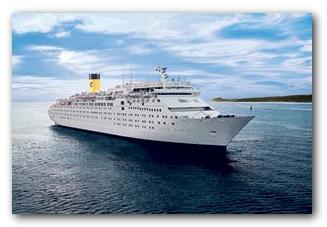
This report describes a paper exercise that ought to get people thinking:
A cruise ship with thousands of tourists on board explodes just a few miles from the terminal in South Boston with terrorists still aboard the burning vessel. Federal, state, and local emergency workers scramble to sort out the bombers from the victims, the kind of bomb used, and how to get the wounded to shore without risking more lives.Of course, while I think it's good to worry about LNG, my reading is that it's a harder target than you might gather from the press treatment and the "cruise ship" scenario is a good one.
The fictional scenario is to unfold today, part of a ''tabletop" homeland security exercise as Boston becomes the fourth of 40 major US ports to check its preparedness for a terrorist assault.
The daylong virtual event at the World Trade Center in South Boston involves the Federal Bureau of Investigation, the Massachusetts Port Authority, the US Coast Guard, Boston fire and police, and the federal Transportation Security Administration.
Organizers acknowledged yesterday that the scenario is not as potentially catastrophic for Boston as an attack on a liquefied natural gas tanker nearing the terminal in Everett, which is the nation's only LNG port in a densely populated urban area. Local officials have for years warned that the targeting of an LNG tanker as it unloaded could kill thousands.
The cruise ship plot, however, is designed ''to get the right people at the table and to give us some challenging issues to struggle over," said Coast Guard Lieutenant Commander Benjamin Benson. Other US scenarios will include a suspicious cargo container and an explosion at a seaport rail yard.